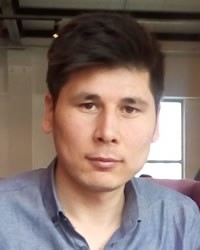Turkmen in Iran

Photo Source:
Anonymous
|
Send Joshua Project a map of this people group.
|
| People Name: | Turkmen |
| Country: | Iran |
| 10/40 Window: | Yes |
| Population: | 1,143,000 |
| World Population: | 8,709,600 |
| Primary Language: | Turkmen |
| Primary Religion: | Islam |
| Christian Adherents: | 0.30 % |
| Evangelicals: | 0.05 % |
| Scripture: | Complete Bible |
| Ministry Resources: | Yes |
| Jesus Film: | Yes |
| Audio Recordings: | Yes |
| People Cluster: | Turkmen |
| Affinity Bloc: | Turkic Peoples |
| Progress Level: |
|
Introduction / History
Turkmen culture has been strongly influenced in the past by both Turkic conquerors, who imposed their language on them, and Arabs, who forced them to convert to Islam. They were nomadic for hundreds of years, making their living by raising livestock and selling Persian slaves they had captured. A common saying was that a Turkmen's home is where his horse is. They began to settle in the 19th century. At that point they became semi-nomadic, herding their sheep and camels during part of the year and growing crops in their homeland the other part of the year. Turkmen tend to be physically strong and easily able to endure the harshness of the environment. They are characterized by their hospitality, sincerity, and trustworthiness; however, they are also known as being hot-headed and revengeful. This latter characteristic led them to sometimes having a hostile relationship with the Persians. The Turkmen's history of settling in Iran started with the Seljuk Empire's conquest of this part of Central Asia in the 11th century. In the 17th and 18th centuries, Turkmen were settling in northern Iran. The Russian conquest of much of the Turkic parts of Central Asia indirectly resulted in Turkmen and Persian forces raiding one another's settlements. Some Turkmen were driven out of their homeland, and they settled in Iran. The Turkmen have their own nation, Turkmenistan, where most of them live. There is also a large population of Turkmen in Afghanistan and northeastern Iran, where they make up about a third of the population. Their language is very different from that of the non-Turkic Iranians. They also live in just about all Central Asian nations and there is even a very small number in India.
What Are Their Lives Like?
In Iran, the Turkmen have given up a nomadic lifestyle and settled down as farmers and cattlemen. The Turkmen still have extended families living under one roof, especially those who life in the country. They have kept most of their tribal Turkmen customs. For example, tribal loyalties continue to have a strong influence over the Turkmen. The largest descent group is the tribe, then the clan, then the family. Members of a tribe are bound by a strong sense of family loyalty. Tribal loyalty is reinforced by the fact that the Turkmen will only marry within their tribes. Arranged marriages are common, and families often intermarry to preserve wealth. Although there have been political and economic changes through the years, less changes have occurred in the areas of family life and religion.
What Are Their Beliefs?
Nestorian Christians entered Turkmenistan in the fourth century AD. ; by the beginning of the fourteenth century, though, any lingering trace of Christianity had been totally replaced by Islam. This transition gradually came to influence the political, civil and economic lives of the people. Today, despite their outward conformity to Islam, mysticism and other past religious traditions are still prevalent among the Turkmen people. Yet a Turkmen in Iran would identify himself as a Muslim even if he does not practice his religious duties.
What Are Their Needs?
There are almost no Christian believers among the Turkmen people. The vast majority of the Turkmen live without the abundant life offered by Jesus, the one who wants to give them joy and salvation.
Prayer Points
Pray for the Holy Spirit to give the Turkmen people in Iran teachable and understanding hearts. Pray that a strong movement of the Holy Spirit will bring entire Turkmen families into a rich experience of God's blessing. Pray for Turkmen families to be drawn by the Holy Spirit to seek forgiveness, and to understand the adequacy of Christ's work on the cross. Pray for teams of Iranian believers to do sustained, focused prayer for the Lord to open the hearts of Turkmen family leaders to experience God's blessing through a movement of family-based discovery Bible studies.